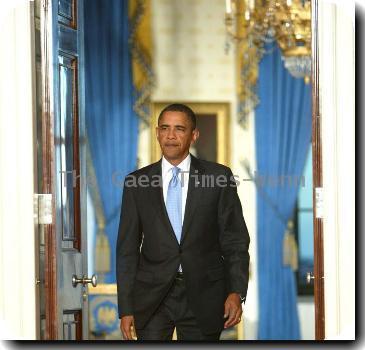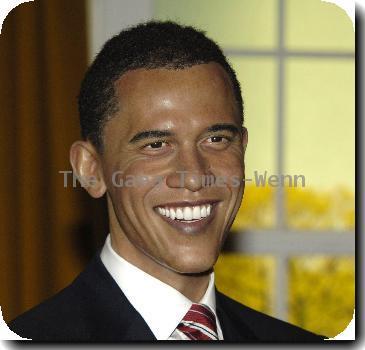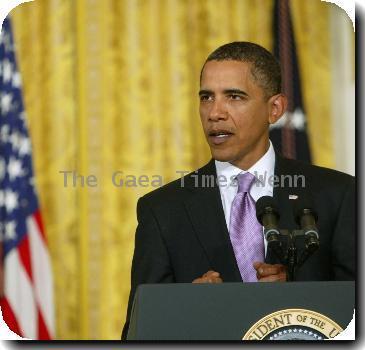Obama pledges to end ‘cozy’ ties between oil companies, regulators, denounces fingerpointing
By Erica Werner, APFriday, May 14, 2010
Obama pledges end to ‘cozy’ oil links, new reviews
WASHINGTON — Declaring himself as angry as the rest of the nation, President Barack Obama assailed oil drillers and his own administration Friday as he ordered extra scrutiny of drilling permits to head off any repeat of the sickening oil spill in the Gulf of Mexico. Engineers worked desperately to stop the leak that’s belching out at least 210,000 gallons of crude a day.
As Louisiana wildlife officials reported huge tar balls littering a beach, BP PLC technicians labored to accomplish an engineering feat a mile below the water surface. They were gingerly moving joysticks to guide deep-sea robots and thread a mile-long, 6-inch tube with a rubber stopper into the 21-inch pipe gushing oil from the ocean floor — a task one expert compared to stuffing a cork with a straw through it into a gushing soda bottle.
It’s the latest scheme to stop the flow after all others have failed, more than three weeks since the oil rig explosion that killed 11 workers and set off the disastrous leak.
Obama, whose comments until now have been measured, heatedly condemned a “ridiculous spectacle” of oil executives shifting blame in congressional hearings and denounced a “cozy relationship” between their companies and the federal government.
“I will not tolerate more finger-pointing or irresponsibility,” Obama said in the White House Rose Garden, flanked by members of his Cabinet.
“The system failed, and it failed badly. And for that, there is enough responsibility to go around. And all parties should be willing to accept it,” the president said.
Obama’s tone was a marked departure from the deliberate approach and mild chiding that had characterized his response since the huge rig went up in flames April 20 and later sank 5,000 feet to the ocean floor. Then came the leaking crude, the endangered wildlife, the livelihoods of fishermen at risk.
The magnitude of the disaster has grown clearer by the day and with it the apparent need for a presidential response to choke off any comparison to the Bush administration’s bungled handling of Hurricane Katrina along the Gulf Coast. White House Press Secretary Robert Gibbs said Obama had been growing increasingly frustrated with the situation, and the congressional hearings hardened that sentiment and prompted the president’s more forceful tone Friday.
Next week administration officials face their own Capitol Hill grillings for the first time since the accident, with Homeland Security Secretary Janet Napolitano appearing before a Senate committee Monday and Salazar testifying on Tuesday.
The Obama administration insists its response has been aggressive since Day One, and Obama sought Friday to leave no doubts. He said he shared the anger and frustration of those affected and would not rest or be satisfied “until the leak is stopped at the source, the oil in the Gulf is contained and cleaned up, and the people of the Gulf are able to go back to their lives and their livelihoods.”
Obama announced that the Interior Department would review whether the Minerals Management Service is following all environmental laws before issuing permits for offshore oil and gas development. BP’s drilling operation at Deepwater Horizon received a “categorical exclusion,” which allows for expedited oil and gas drilling without the detailed environmental review that normally is required.
“It seems as if permits were too often issued based on little more than assurances of safety from the oil companies,” Obama said.
Echoing President Ronald Reagan’s comment on nuclear arms agreements with Moscow, he said, “To borrow an old phrase, we will trust but we will verify.”
Obama already had announced a 30-day review of safety procedures on oil rigs and at wells before any additional oil leases could be granted. And earlier in the week Interior Secretary Ken Salazar announced plans to split the much-criticized Minerals Management Service into two agencies, one that would be charged with inspecting oil rigs, investigating oil companies and enforcing safety regulations, while the other would oversee leases for drilling and collection of billions of dollars in royalties. Salazar has said the plan will ensure there is no conflict, “real or perceived,” regarding the agency’s functions.
The House Committee on Oversight and Government Reform announced Friday it is opening an investigation into potential oversight lapses at the Minerals Management Service.
Obama decried what he called “a cozy relationship between the oil companies and the federal agency that permits them to drill.” But the president, who’s announced a limited expansion of offshore drilling that’s now on hold, didn’t back down from his support for domestic oil drilling, saying it “continues to be one part of an overall energy strategy.”
“But it’s absolutely essential that, going forward, we put in place every necessary safeguard and protection,” he said.
This week executives from three oil companies — BP PLC, which was drilling the well, Transocean, which owned the rig, and Halliburton, which was doing cement work to cap the well — testified on Capitol Hill, each trying to blame the other for what may have caused the disaster. Obama decried that scene.
“I did not appreciate what I considered to be a ridiculous spectacle during the congressional hearings into this matter. You had executives of BP and Transocean and Halliburton falling over each other to point the finger of blame at somebody else,” the president said.
“The American people could not have been impressed with that display, and I certainly wasn’t.”
BP hadn’t publicly discussed the latest maneuver to stop the leak until the past few days, and went ahead with it only after X-raying the well pipe to make sure it would hold up with the stopper inside, spokesman David Nicholas said. Technicians also had to check for any debris inside that may have been keeping the oil at bay — dislodging it threatened to amplify the geyser.
Philip Johnson, the petroleum engineering professor at the University of Alabama who made the soda bottle-and-cork comparison, said the idea was that a cork stopper by itself would probably be blown off, but a straw would lower the pressure on the cork, allowing the soda (or oil) to pass into another container — in this case a tanker at the surface.
BP has refused to estimate how much of the leak could be siphoned off through the skinny pipe, though Johnson said it could be a significant amount.
If it works, it would mark the first time since the rig exploded that BP has controlled any part of the rogue well. How much oil is actually leaking has become a matter of debate, and Obama said Friday that it was uncertain but that the federal government’s response was always geared toward a catastrophic event.
Associated Press writers Matthew Daly and Frederic J. Frommer in Washington and Jeffrey Collins in Robert, La., contributed to this report.
Tags: Accidents, Barack Obama, Energy, Environmental Concerns, Government Regulations, Industry Regulation, Legislature Hearings, North America, Oil spill, Products And Services, United States, Washington, Wildlife












